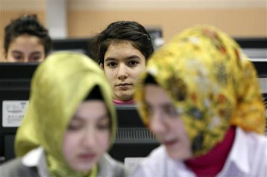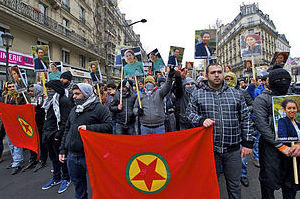The Islamization of Turkey: Erdoğan’s Education Reforms
By Svante E. Cornell (vol. 8, no. 16 of the Turkey Analyst)
The growing efforts at Islamization of Turkish society have largely gone unnoticed. For many years, Islamization was the dog that did not bark: in spite of dire predictions by secularists, the AKP did not introduce conspicuous efforts to Islamize Turkey. But since 2011, this has changed. The main exhibit is the education sector, which President Recep Tayyip Erdoğan has remodeled to instill considerably more Islamic content, in line with his stated purpose to raise “pious generations”. Ultimately, the Islamic overhaul of the education system is bound to have implications for Turkey’s civilizational identity, and on the choices it will make on where it belongs politically.

Turkey’s New Caretaker Government is a Pure AKP Government in Disguise
By M. K. Kaya (vol. 8, no. 16 of the Turkey Analyst)
In violation of the Turkish constitution, Ahmet Davutoğlu’s new caretaker cabinet is a pure AKP government. The government may be temporary, but it is nonetheless nothing but an expression of the determination of the AKP to secure permanent power. Both the process that led to its formation and its extra-constitutional composition bears testimony to the power-grab of the AKP.
What the Columnists Say
Etyen Mahçupyan in Akşam writes that the cease-fire ended because PKK started to seek independence in Rojawa, and because Turkey did not want to have a PKK state at its border. “PKK has shot itself in the foot,” he writes. Metin Münir on the t24 news site finds it incredible that PKK chose to respond to Erdoğan’s restart of the war in what he describes as the most stupid way possible, by returning to terrorism. Orhan Bursalı in Cumhuriyet writes that PKK is laying the ground for secession from Turkey. Kemal Öztürk in Yeni Şafak warns the AKP that the party is losing the public relation battle to PKK among the Kurds, and that yet another electoral disaster is looming. Şahin Alpay in Zaman writes that even though Erdoğan is the chief responsible for why calm and stability continue to elude Turkey, the fundamental reasons for this are inscribed in the genetic code of the republic.

Alpay: authoritarianism is inscribed in the genetic code of our republic
Şahin Alpay in Zaman writes that Turkey has certainly entered a period of instability that is not going to be short-lived. No doubt, President Erdoğan is the chief responsible for this. Yet this fact should not lead us to overlook the main reasons for why calm and stability continue to elude Turkey. A multicultural country like Turkey, with its multiple identities, can only become calm and stable when freedom and a pluralistic democracy has been put in place. Unfortunately, the genetic code of the republic does not allow for this. Erdoğan is faithful to the founding tradition of the republic when he views every kind of opposition as treason and when he does not tolerate that civil society becomes stronger. The second founding stipulation of the republic was that a modern society could only be constructed if the whole of society was made Muslim and if Islam was controlled by the state through the State Directorate of Religious Affairs. Indeed, the AKP, which stands for Turkish nationalism mixed with a sauce of Islamism, does not recognize the freedom of belief and continues to impose the religion of the State Directorate of Religious Affairs.
Erdoğan’s War: The Causes and Consequences of the Upsurge in Kurdish Violence
By Gareth Jenkins (vol. 8, no. 15 of the Turkey Analyst)
In recent weeks, Turkey has been wracked by an escalation in Kurdish-related violence. Not only could the upsurge have been prevented but there are fears that the worst may yet be to come. The fear is that President Recep Tayyip Erdoğan may order an even harsher crackdown over the weeks ahead and that, with its rural units depleted by deployments to Iraq and Syria, the PKK may increasingly respond by staging attacks, including more suicide car bombings, in the cities.




